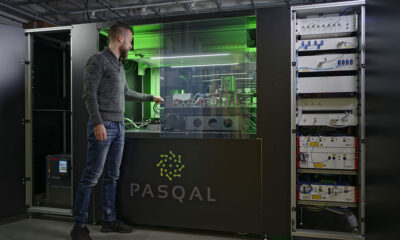News
Saudi Arabia Launches $200 Million High-Tech Investment Fund
The spending is part of King Abdullah University of Science and Technology’s strategy to promote economic diversification and create new technical jobs.

Saudi Arabia’s Crown Prince Mohammed bin Salman has announced the launch of a $200 million fund to invest in domestic and international tech firms as part of the Kingdom’s economic diversification plan.
The investment fund is part of a strategy devised by the King Abdullah University of Science and Technology (KAUST) and focuses on “increasing the likelihood of turning research into economically beneficial innovations”.
Plans include launching the National Transformation Institute for Applied Research (NTI) to improve technology development and commercialization, restructuring research centers, and creating a new fund to “enhance economic diversification and contribute to the creation of high-quality technical jobs”.
HRH the Crown Prince launches KAUST's new strategy, which aims to transform research into economically productive innovations by focusing on the national priorities for research, development, and innovation.https://t.co/yvZ8UnnFcR#SPAGOV pic.twitter.com/yEqS7Zia05
— SPAENG (@Spa_Eng) August 20, 2023
“The new strategy builds on Kaust’s scientific and academic achievements and represents a new era for the university to become a beacon of knowledge and a source of inspiration and innovation in line with Vision 2030 aspirations,” Prince Mohammed explained in a recent press release.
Technology is an essential pillar of Saudi Arabia’s economy as the country transitions away from oil production. The Kingdom is projected to invest $34.6 billion on information and communications technology by the end of 2023, making it the top-spending nation in the Middle East, Turkey, and Africa.
Also Read: Dubai Municipality To Test Construction Materials Using AI Robots
In February, Saudi Arabia announced plans to invest $9 billion in its technology sector, which includes a $2.1 billion commitment from Microsoft. In addition, Oracle has announced plans to invest $1.5 billion in Saudi cloud computing, and Huawei has earmarked $400 million to enhance the country’s cloud infrastructure.
Meanwhile, King Abdullah University of Science and Technology will continue collaborating with several international tech companies, including IBM and Boeing, and has partnered with academic and commercial institutes in Shenzhen on aerospace, robotics, and microelectronics projects.
News
Mamo Completes $3.4M Funding Round To Enhance Fintech Services
The startup will use the influx of cash to expand into Saudi Arabia and across the wider GCC while improving its product offering.

UAE-based fintech Mamo has announced the completion of a $3.4 million funding round that will help the startup extend its market presence and improve its product offering. Investors included 4DX Ventures, the Dubai Future District Fund and Cyfr Capital.
Mamo’s platform offers “payment collection, corporate cards and expense management” to help small and medium-sized businesses consolidate and streamline their operations. With the latest influx of capital, Mamo will further develop its comprehensive suite of services and begin testing its product lines in Saudi Arabia, further extending its footprint across the GCC.
Imad Gharazeddine, co-founder and CEO of Mamo, stated: “We’ve been in the market for a while now and are incredibly proud of what our team has achieved. The holistic and expansive nature of our product offering has helped us continue to grow sustainably. This additional funding will allow us to reach our medium-term goals even faster. The support from new and existing investors is a testament to our strong expertise and the ability to deliver on our customer promise”.
Daniel Marlo, General Partner of lead investor 4DX Ventures, added: “We have immense trust in Imad’s vision, leadership and Mamo’s innovative approach to provide a user-friendly and comprehensive financial solution for SMEs that makes financial management more accessible and efficient. We are proud to partner with them and support their mission”.
Also Read: A Guide To Digital Payment Methods In The Middle East
Amer Fatayer, Managing Director of Dubai Future District Fund’s investment team, also commented: “Mamo’s localized product lines serve as an infrastructure for SME payments and spend management in UAE, a segment that is underserved by the country’s current banking infrastructure. The team has taken a product-first approach to consolidating SMEs’ financial journeys and building a fintech solution deeply embedded in a business’s core operations”.
To date, Mamo has raised around $13 million in investment funding and now boasts a team of 30 people. The company’s intuitive financial services platform has allowed over 1,000 businesses to consolidate their financial operations and significantly reduce payment fees.
-

 News4 weeks ago
News4 weeks agoAmazon Prime Day 2024: Get Ready For 6 Days Of Amazing Deals
-

 News4 weeks ago
News4 weeks agoSamsung Unpacked 2024: What To Expect From The July 10 Event
-

 News3 weeks ago
News3 weeks agoCoursera Report Shows Surge In UAE Interest In AI Upskilling
-

 News4 weeks ago
News4 weeks agoMeet Dubai’s Groundbreaking Smart Robot Delivery Assistant
















